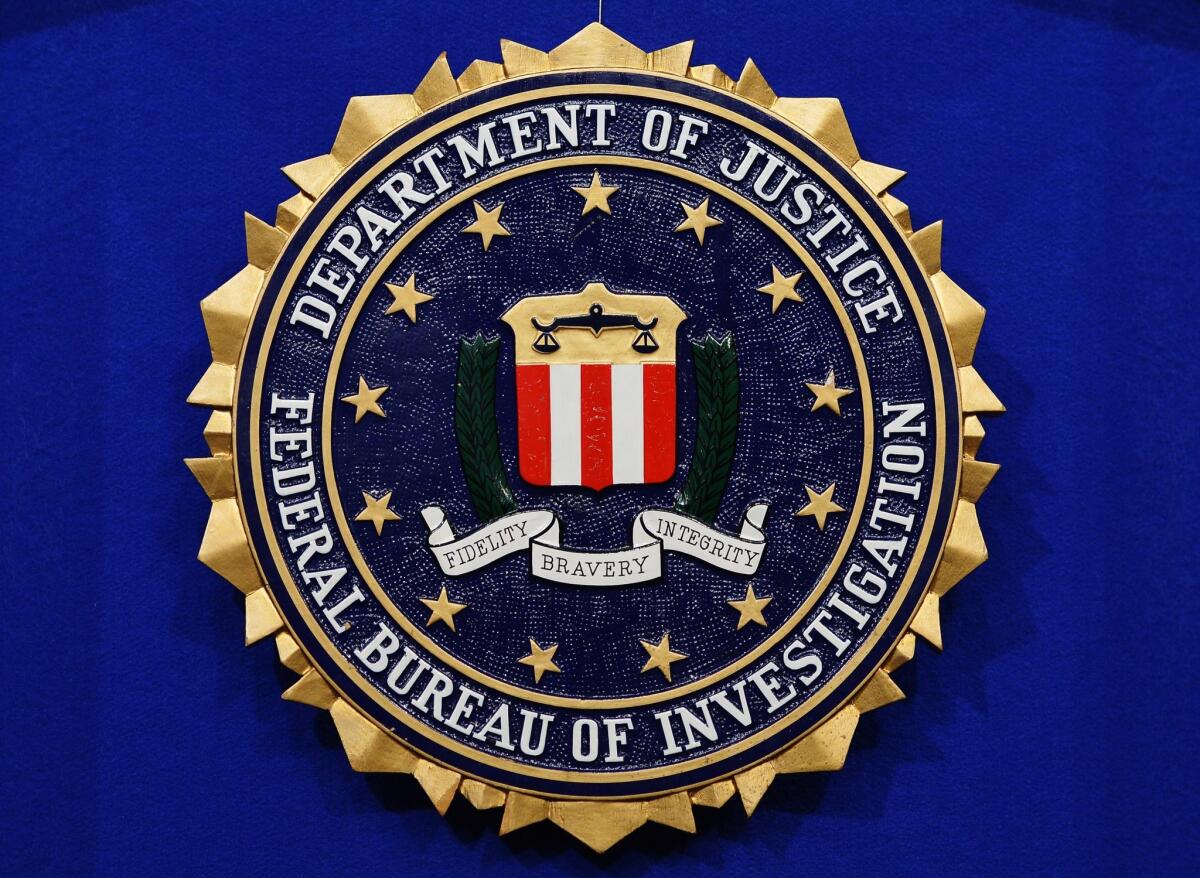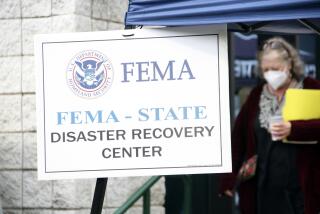U.S. Muslim leaders say FBI pressuring people to become informants

- Share via
Reporting from Las Vegas — Muslim leaders nationwide say the FBI is pressuring some Islamic community members and religious leaders to spy on fellow Muslims as part of a government effort to combat extremist recruiting in the U.S.
The campaign has intensified in recent weeks, with mosques in California, Texas, Minnesota, Ohio, Florida and other states reporting unannounced visits by FBI agents, according to the Council on American-Islamic Relations, or CAIR, the nation’s largest Muslim civil rights and advocacy organization.
In a nationwide alert, the group urged mosque and community leaders to seek the advice of an attorney if they are approached by the FBI for questioning. They worried that the civil rights of numerous imams were being violated as the religious leaders were asked to meet with FBI agents, who then pressed them to inform on members of their congregations.
“It’s happening all over the country,” said Ibrahim Hooper, a Washington-based spokesman for CAIR. “The agents are approaching these community leaders at mosques with basic questions that quickly turn into something different: pressure to become informants.”
Leaders at several mosques in California and Minnesota contacted for comment said they were afraid to speak out for fear of becoming a government target.
The FBI would not comment on the CAIR alert, but spokesman Paul Bresso said in an email that the agency respected the rights of all citizens and “we value our partnerships with the Arab, Muslim and Sikh communities as they are partners in our efforts to stem crime, violence and civil rights violations.”
One agent said such visits were standard procedure. “It’s not unusual for us to go out and talk to, I don’t want to call them at-risk folks, but people dealing with issues,” said the agent, who declined to give his name because he was not authorized to talk about the matter.
Jennifer Wicks, an attorney who heads the civil rights department for CAIR, said she knew of no crimes committed by FBI agents. “No one has been detained in any way or taken from one setting to another,” she said.
She said the interrogation tactics depended on the agent and the situation.
“These visits aren’t based on people being suspected of doing anything wrong. It’s because this is a Muslim community. That’s why people are being targeted,” Wicks said.
“However, the FBI’s over-broad and coercive use of informants in mosques, reports of outreach meetings being used for intelligence gathering and other acts of abuse demonstrate that community leaders should engage legal professionals to ensure the protection of their rights and those of their congregations,” Wicks said in a statement on the CAIR website.
Activists said the visits were tantamount to religious profiling.
“For us, the issue is one of civil rights,” Hooper said. “Too often these interactions are done in private and people feel coerced. Because ISIS is a hot topic, they’re going to mosques. It’s all based on the round-up-the-usual-suspects style of law enforcement.”
Federal officials are calling for new ways to fight what they see as the nation’s latest national security threat: people indoctrinated by extremists returning to plan terrorist acts here. The Justice Department recently unveiled a pilot program in Los Angeles, Boston and Minneapolis that enlists social and mental health workers, religious leaders and police to thwart Islamist group recruiters.
Orlando, Fla., attorney Hassan Shibly said he had represented 33 clients this year who claimed they had been pressured by the FBI to release information on their religious beliefs and practices. He said the number of cases had risen dramatically in the last few weeks.
“In Orlando, they pressured one citizen who happened to be Muslim to spy on mosques, Islamic restaurants and hookah lounges or they would throw him in jail,” he said. “In another case, they approached an imam with pictures of a woman they claimed would testify of an affair unless he helped them. These are law-abiding Muslims, not criminals.”
He has taken those and other cases to court, alleging the FBI was using illegal tactics to gain information.
Shibly said Muslims were targets because many didn’t know their legal rights.
“The FBI thinks it can get away with bending the law,” he said. “Many Muslims come from Third World countries where such practices are common fare for the secret police. But in the U.S. you don’t expect such blackmail, with threats of deportation or worse.”
In several cases, Shibly said, imams were asked about their opinions on political affairs and other matters. Agents return and tell the imams that informants have contradicted their previous statements. “They are laying the groundwork for a charge of giving false information to a law enforcement officer. That’s the trick to get them to cooperate,” he said.
In Florida, tips from the Muslim community led to the arrest of Sami Osmakac, later convicted of planning a terrorist attack at a Tampa-area nightclub. Osmakac was found guilty in June of attempted possession of a weapon of mass destruction.
More to Read
Sign up for Essential California
The most important California stories and recommendations in your inbox every morning.
You may occasionally receive promotional content from the Los Angeles Times.











